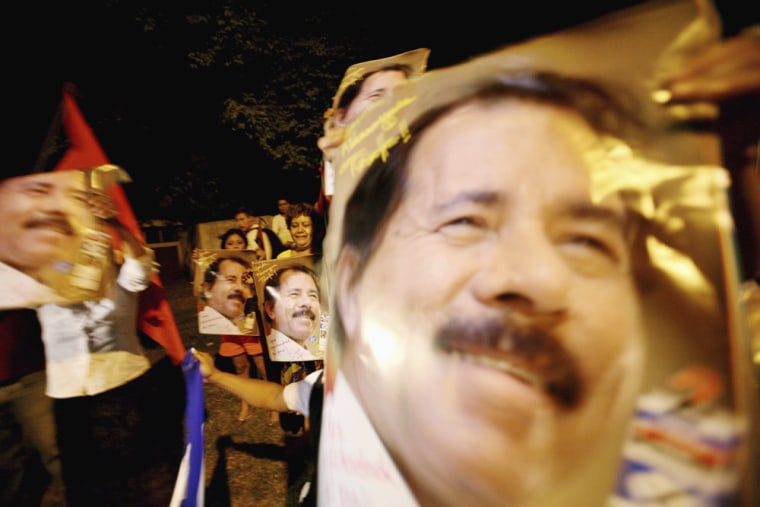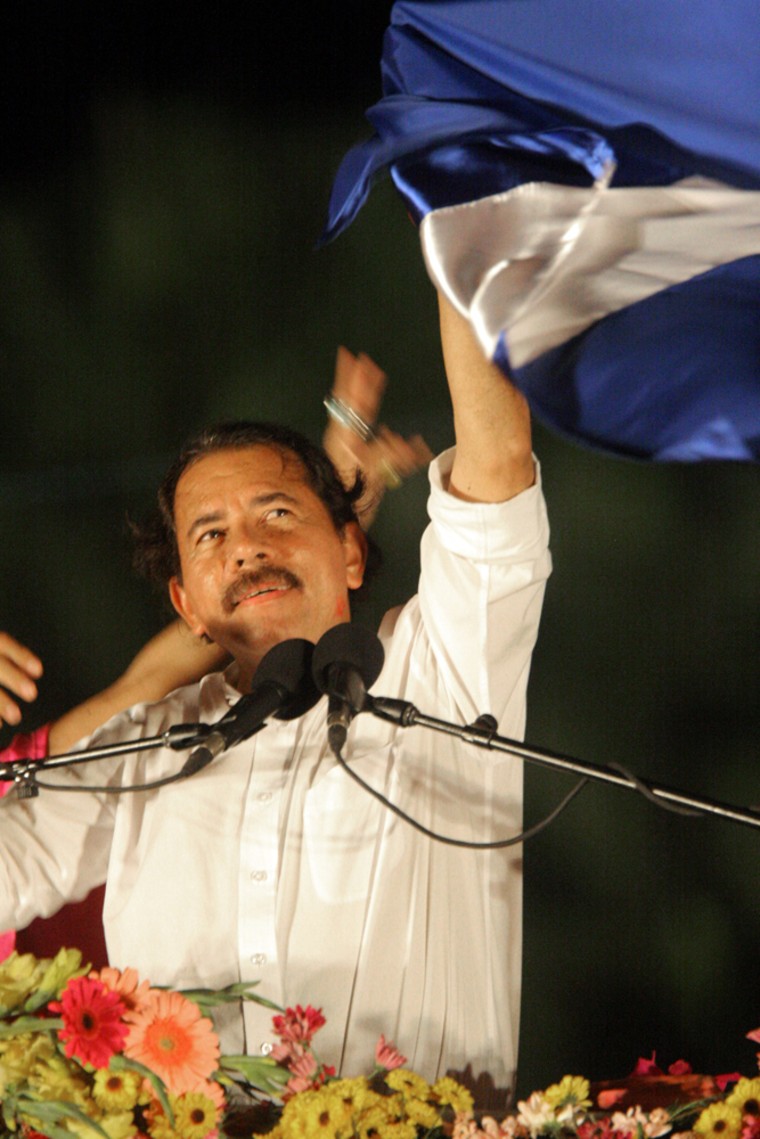Latin America’s leftists welcomed the return of Daniel Ortega to Nicaragua’s presidency, but rivals of the former Marxist who fought a U.S.-backed insurgency said Wednesday they would do everything possible to keep him from cutting ties to Washington.
Cuban President Fidel Castro, a key backer of Ortega’s radical Sandinista government in the 1980s, sent congratulations published Wednesday on the front page of the Communist Party daily Granma, saying the Nicaraguan election “fills our people with joy, at the same time filling the terrorist and genocidal government of the United States with opprobrium.”
In Washington, the State Department said Wednesday that it looks to establish “positive relations” with the Nicaraguan government of President-elect Daniel Ortega, a former rival who won Sunday’s presidential elections.
Spokesman Gonzalo Gallegos said cooperation with Ortega and his Sandinista colleagues will be “based on their action in support of Nicaragua’s democratic future.”
Olive branches between Managua, D.C.
Ortega has said he wants to maintain relations with Washington while forging closer ties with Cuba and Venezuela. During the campaign, he also projected a far more moderate image compared with his days as a Marxist-Leninist firebrand.
The Reagan administration forcefully opposed Ortega when he was president during the 1980s, backing anti-communist rebels who took up arms against him.
Both Washington and Managua seem intent on a more amicable relationship during Ortega’s second time around.
“We respect the decision of the Nicaraguan people,” Gallegos said, alluding to the elections.
Chavez calls for ‘uniting’
On Tuesday, Venezuelan President Hugo Chavez said he and Ortega would be “uniting as never before” to construct a socialist future.
Ortega, however, has so far held to his campaign theme of reconciliation, indicating he hopes to avoid the fearsome hostility with the United States and the flight of local businessmen that marked the 11 years of Soviet-backed Sandinista rule after the leftist rebels overthrew a dictator in 1979.
Radical economic policies and the U.S.-financed Contra insurrection created economic chaos and killed 30,000 people.
Speaking with Eduardo Montealegre, who conceded defeat late Tuesday, Ortega talked of promoting stability while working to eliminate poverty in the Western Hemisphere’s second-poorest country.
Ortega reassures investors
Now a balding 60-year-old, Ortega reassured investors he was open to business and promised to “create a new political culture” that would “set aside our differences and put the Nicaraguan people, the poor first.”
“We are showing the country that things are stable, that we can set aside our political positions and put first our commitment to pull Nicaragua out of poverty,” he said in a brief speech.
Ortega also has promised to try to maintain relations with Washington, while building a friendship with Venezuela and Cuba.

Montealegre told a local television show on Wednesday that he would use his party’s strength in Congress — second only to the Sandinistas — to ensure that Ortega does not reject the United States and turn toward Chavez and Castro during his five-year term.
The Harvard-educated banker vowed to “use every connection I have to make the relationship with the U.S. work.”
“We can’t afford to give Ortega an excuse to let his only support be Fidel Castro and Hugo Chavez,” he said, adding: “I will become an important channel so he doesn’t fall into Chavez’s hands.”
U.S. Commerce Secretary Carlos Gutierrez, who previously warned against an Ortega win, said Tuesday that he was ready to work with the new Nicaraguan leader.
In an interview with The Associated Press on Tuesday, Ortega’s vice president, Jaime Morales, a former Contra who was once one of Ortega’s biggest enemies, said the first thing the new administration would do is “talk immediately with all the businessmen to maintain their confidence and reassure them that everything’s fine.”
With 91 percent of the votes tallied, Ortega had 38 percent of the votes compared to 29 percent for Montealegre. Under Nicaraguan law, the winner of Sunday’s election must have 35 percent of the vote and a lead of 5 percentage points to avoid a runoff.
The victory capped Ortega’s 16-year quest for his old job. After losing the presidency to Violeta Chamorro in 1990, he ran two consecutive, unsuccessful presidential campaigns.
“I’m happy that at last we have won,” said 34-year-old Maria Rosario Ruiz. “I voted in the last two election, and we’ve finally won!”
